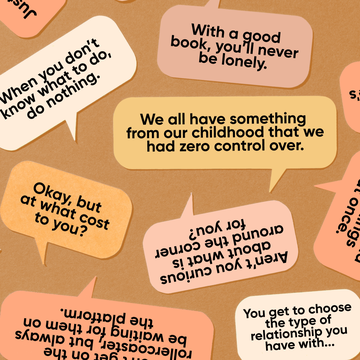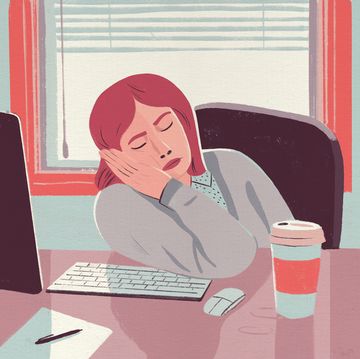Loud snoring, sheet-tugging, a post-pandemic craving for personal space. We get why so many couples are opting for sleep divorces right now. (Per a January 2023 survey by the International Housewares Association, one in five adults sleeps in a separate bedroom from their significant other; 22 percent of them “moved out” of a shared room in the last year.) But are people who choose solo slumber over spooning doomed to grow apart? Just the opposite, say three happy couples who shared their dream set-ups with us.
Couple #1: Same Bed, Separate Covers.
A few years ago, Jennifer Norman and Timothy Caraher, who live in San Francisco, started having issues in the bedroom—but not the usual kind. “To be blunt, I’m almost 50 and I’m going through perimenopause, and I have hot flashes,” says Norman, who started feeling smothered under the couple’s thick comforter. Another wrinkle: Careher is a sheet-tugger. Something had to give, so Careher hit up their local Macy’s and bought two twin goose down comforters, one medium weight and one light—a hack they’d discovered on a trip to Sweden, where it’s common practice for people to sleep with individual blankets when sharing a bed. The set-up, called the Scandinavian method, “was a very easy, very pragmatic solution,” says Caraher. Adds Norman, “When you’re the master or mistress of your own bedding, you sleep a whole lot better.” Couples’ sleep issues caused by menopause are highly prevalent,” says Wendy M. Troxel, PhD, a Senior Behavioral and Social Scientist at the Rand Corporation and author of Sharing the Covers: Every Couple’s Guide to Better Sleep. “The Scandinavian method allows people to enjoy the benefits of sharing a bed (cuddling, intimacy) while allowing space for individualized sleep.”
Couple #2: “I Tuck Him in Every Night.”
Amanda Gajdosik and her husband, Seth Muskavitch, have never shared a bedroom, not even when they were dating—“not for Puritanical reasons, but for logistical, practical reasons,” says Gajdosik. When they moved in together, Muskavitch worked at night, getting home around 2am. Gajdosik, a food blogger, rises at dawn every day. Four years later, the Wisconsin couple are parting ways at bedtime, even though Muskavitch’s schedule has done a 180. “He gets up before me and goes to bed before me,” says Gajdosik. “And it sounds silly because we’re in our thirties, but I tuck him in. I go in, say good night, and we talk about our day a little bit. It’s a moment to connect.” When it comes to sex, adds Gajdosik, “It’s like, ‘Your place or mine?’ It’s still natural, it’s still very romantic. And part of that is because we are well-rested. We are not going to bed dog tired and annoyed at one another.”
More From Oprah Daily

Biology comes into play, too: “Sleep directly affects sex hormones, including testosterone,” says Troxel. One study published in the Journal of the American Medical Association found that healthy young men who were sleep-deprived for about a week showed a 10% reduction in testosterone levels. “To put that to perspective, that's about the equivalent of aging a man hormonally by about 10 years,” Troxel says. Studies also show that each extra hour of sleep a woman gets is associated with a significant increase in her sex drive and sexual pleasure.
Couple #3: Saved by a Separation.
Soon after Siobhan Lauren moved into a one-bedroom place with her partner Jaime in 2019, it was apparent that bunking together was a terrible idea. He was a night owl who worked into the early hours of the morning, and she has sleep apnea and stirs easily. Their mutual exhaustion soon manifested into ugly arguments, recalls Lauren, a content creator. Indeed, Troxel’s research shows that couples who get insufficient sleep are not only more likely to engage in conflict, but when they do fight, it’s vicious. Toxic behaviors “like hostility, being overly critical and sarcastic, and trying to dig into your partner” come into play, she says.
To find a solution, the pair looked to their parents. Both sets have been married for over 25 years and keep separate bedrooms. “In both cases, there’s a partner who snores,” explains Lauren. “So our parents normalized it when we were growing up. They showed us that you can still have a loving dynamic with your partner, and I saw first-hand the positive impact it made on my parents’ relationship when they got a good night's sleep.”












